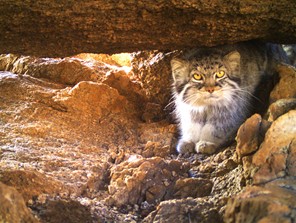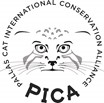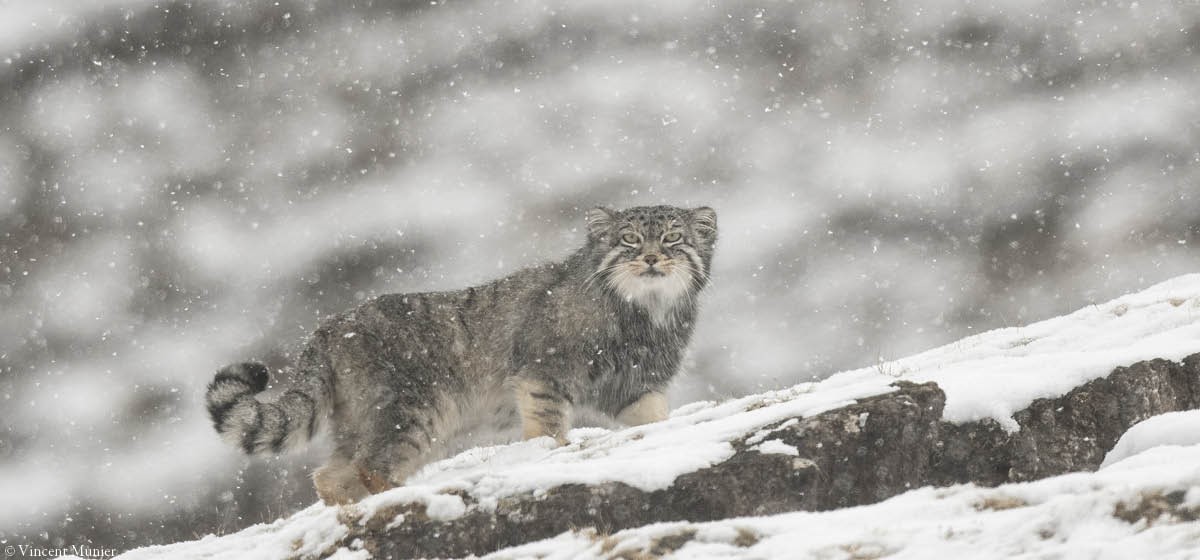Pallas's cat
The Pallas's cat (Otocolobus manul) is a small feline that lives among the mountains and grasslands of Central Asia. The species has a large distribution area that includes 16 countries and extends from Iran in the west to China and Mongolia in the east, but its actual occurrence in the distribution area is largely unknown.
The Pallas's cat is not threatened from a global perspective, but many of the populations in the distribution area are small, isolated and declining and the species risks local or regional extinction. The species is threatened by the destruction of its habitats, they are killed by domestic dogs, they get caught in traps intended for other species and their natural prey such as rodents and piphars are poisoned.
The Pallas's cat is one of the world's least studied felines and the lack of knowledge is something that limits the development of targeted conservation measures for the species. To improve our knowledge of the species and at the same time improve the global conservation measures, Pallas’s cat International Conservation Alliance (PICA) was established. PICA is an international collaboration between Nordens Ark, the Royal Zoological Society of Scotland, the Snow Leopard Trust and Fondation Segré.

Pallas's cat. Photo: Wildlife Initiative and the S. Illinois University
What we do at Nordens Ark
PICA's overall goal is to increase the conservation measures for the Pallas's cat within the species' distribution area and at the same time increase the global awareness of the species. PICA works to preserve the Pallas's cat through research, education and strategic planning.
An important part of this work is to promote cooperation between different stakeholders and PICA works closely with Pallas's cat Working Group, IUCN Cat Specialist Group and other researchers and Pallas's cat experts. By working together with this extensive network, PICA has played an important role in the coordination and development of the species' first global conservation strategy.
To support various conservation initiatives in the spreading countries, PICA started the PICA Small Grant Program in 2020. Here, researchers and organizations can annually apply for money for various projects that will increase knowledge about the Pallas's cat and the threats that the species faces. Through PICA, we currently support 11 research and conservation projects in 8 different distribution countries.
An important element in all conservation projects is education and information. If people do not know the species we want to preserve, it is unlikely that they will show interest or support for the conservation project. This is of course extra important in areas where the local population is directly affected, both negatively and positively, by the species we work with. PICA works on several fronts to spread information about the Pallas's cat. The focus is on disseminating knowledge in the countries of distribution but also to zoos around the world. Among other things, we have developed a standardized educational material, translated into several languages, which can be used in several different countries and produced a children's book together with United For Literacy and IUCN Cat Specialist Group
News from the project - January 2026
Four new projects were awarded funding through the PICA Small Grant Programme in 2025, including, for the first time, two projects in India. Since the PICA Small Grant Programme was launched in 2020, it has supported 18 projects across nine countries, distributing more than €150,000 to a wide range of conservation initiatives and strengthening collaboration between field biologists, researchers and zoos worldwide. As a result, knowledge of the species’ ecology, threats and behaviour has increased significantly.
In October 2025, Nordens Ark took part in an international workshop in Kazakhstan focused on developing standardised methods for monitoring Pallas’s cat populations in Central Asia. The workshop brought together experts from, among others, Kazakhstan, Russia, Uzbekistan and Mongolia, with the aim of establishing shared protocols to enable comparable population monitoring across national borders. On the final day of the workshop, a meeting was also held to update the international conservation strategy for the species. The original strategy was developed at an international meeting at Nordens Ark in 2018, and the 2025 revision provided an opportunity to assess progress and adjust priorities.
In collaboration with
Fondation Segré, Snow Leopard Trust och Royal Zoological Society of Scotland.




